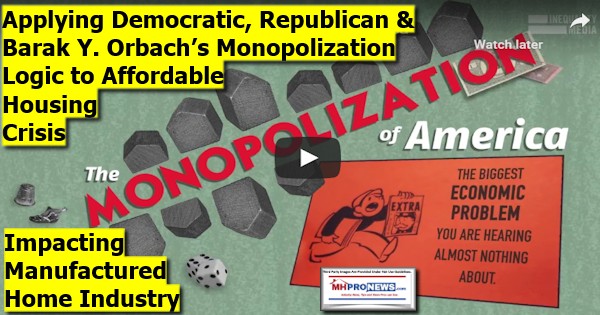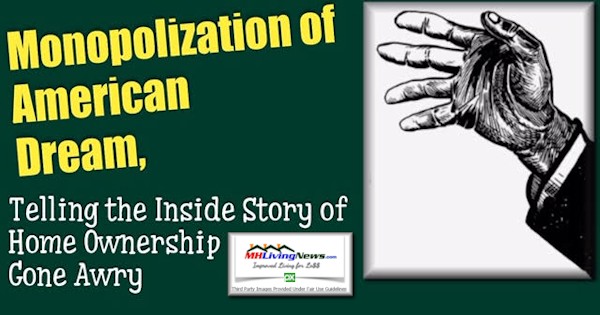
What follows below is a public reply from our publisher to a professional whom we have forged a relationship over the course of about a decade. For some time, Tim Williams was a self-described friend to our publisher, this publication and our family. He praised us publicly for years in writing and on camera.
Our publisher L. A. “Tony” Kovach could have chosen any number of ways to respond to Williams’ recently emailed claims. The manner Tony Kovach has chosen merits an introduction for those who don’t know the background or who weren’t BCC’d by Williams or saw those forwarded emails. While the word “alleged” is used herein, the evidence to support is also cited and linked. Providing evidence to claims made has been the pattern of MHProNews and MHLivingNews for years. Why? Because it respects the reader’s ability to see the merit to any given claim. It fits our mantra, “We Provide, You Decide,” ©
Tony Kovach’s message is focused on specific claims made by Williams, who per MHProNews sources was “pushed” into launching into an emailed exchange with our publisher shortly after several exposes were published that included documents provided to MHProNews by a whistleblower with apparent insider information and ties to the Manufactured Housing Institute (MHI). Who that source was is no doubt of intense interest to MHI, as questions swirl if their President Mark Bowersox or another there might be behind an obvious attempt to expose years of apparent ‘conflicts of interest’ involving MHI CEO Gooch lobbying for conventional housing organizations while she was a national manufactured housing association’s EVP and lobbyist.
Rephrased, the timing of Williams’s emailed thread could be construed as a distraction from very real issues of concern. Those issues include the following.
- Is MHI working on behalf of all segments and firms of all sizes of the industry, as they claim?
- Or are they working for the interests of a select few companies whose aim is to consolidate the industry into a relatively small number of hands?
- If they are working to consolidate the industry, are they doing so in a manner that harms the value of the firms of thousands of manufactured home industry independents?
- Or is consolidation in manufactured housing being orchestrated in contravention of antitrust or other laws in a fashion that undermines the values of millions of manufactured homeowners, and is simultaneously short-changing investors in manufactured housing companies?
That’s not unfounded hyperbole. Consider this from an EVP of an MHI member company.
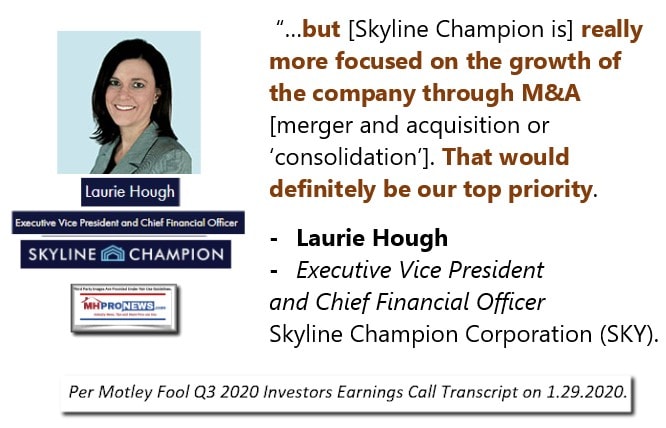
Further, a non-manufactured housing nonprofit group has publicly weighed in on concerns that parallel those raised by MHProNews, by various tipsters with ties to MHI, by the rival Manufactured Housing Association for Regulatory Reform (MHARR) and by various mainstream media accounts.
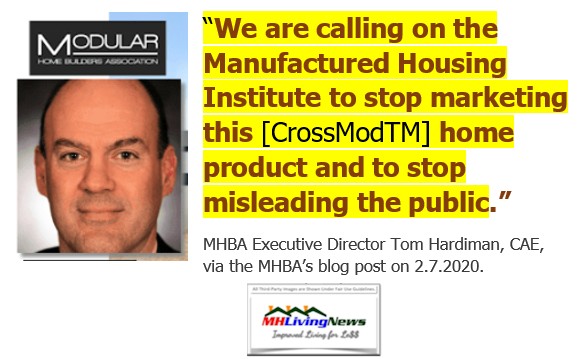
Additionally, media accounts often include letters from public officials that specifically name certain companies that routinely have direct ties to MHI. Is that routine coincidence to be ignored?
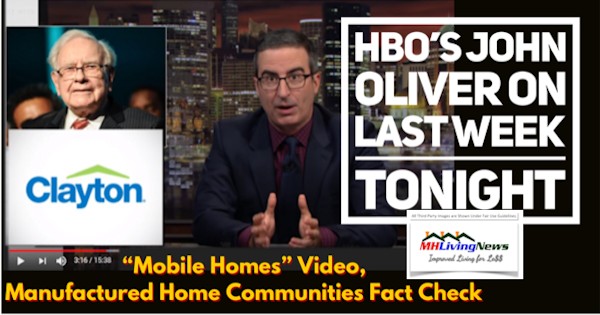
Furthermore, the behavior of MHI and certain “big boy” companies has arguably harmed the interests of consumers. Who says? Public officials, which includes in no certain order of importance:
- Elected state officials. Examples are linked here and here.
- State Attorneys General. An example is linked here.
- Federal elected officials, which includes Congressional and S. Senators.
- Federal agencies, which includes – per Congressional letters and various published reports – the SEC, CFPB, FTC, HUD, and others. See the report linked here that addresses both this and the prior bullet.
That’s an array of smoke from a wide variety of sources that no other trade publisher in manufactured housing has reported on with more evidence and greater depth of coverage of the claims and related analysis than MHProNews and our MHLivingNews public-facing sister site.
In fairness, the allegations against MHI raised publicly by the Modular Home Builders Association (MHBA) Executive Director Tom Hardiman came after Tim Williams’ emails to Tony Kovach. But Hardiman’s concerns are nevertheless relevant. In what way? Because the fears publicly and formally raised by the MHBA mirror several items that MHProNews and MHLivingNews spotlighted about the potential harm creating the perception of a two-tiered HUD Code would cause millions of manufactured home owners. That in turn has an impact on the independently owned firms that serve those homeowners and others who seek affordable housing.
Rephrased, Hardiman’s concerns ought to cause all objective thinkers in manufactured housing and the public officials who track this site to sit up and lean in. His claim that MHI’s CrossModTM homes ploy is “deceptive” and undermines the values of existing manufactured homes. While Hardiman downplays those numbers, they logically apply to millions of existing HUD Code manufactured homes.
Cavco Industries (CVCO) is a publicly traded firm. As such they have a variety of legal disclosures, they must make which includes standards that are supposed to be kept in their reporting and published statements. By law, those standards that regulate communications from publicly traded firms are supposed to give prospective and actual investors the maximum amount of accurate and actionable information possible in making investment decisions.
As such, a public firm is not supposed to knowingly give inaccurate information without risking legal penalties.
Cavco has stated graphically that manufactured housing is underperforming. Per Cavco, the 30 year average for manufactured housing production is 170,000 units. Per data provided by HUD to the Manufactured Housing Association for Regulatory Reform, in 2019, there were 94,615 manufactured homes produced. That means that the industry is operating at only 55.65% – marginally over ½ – of the historic norm. That’s documented underperformance.
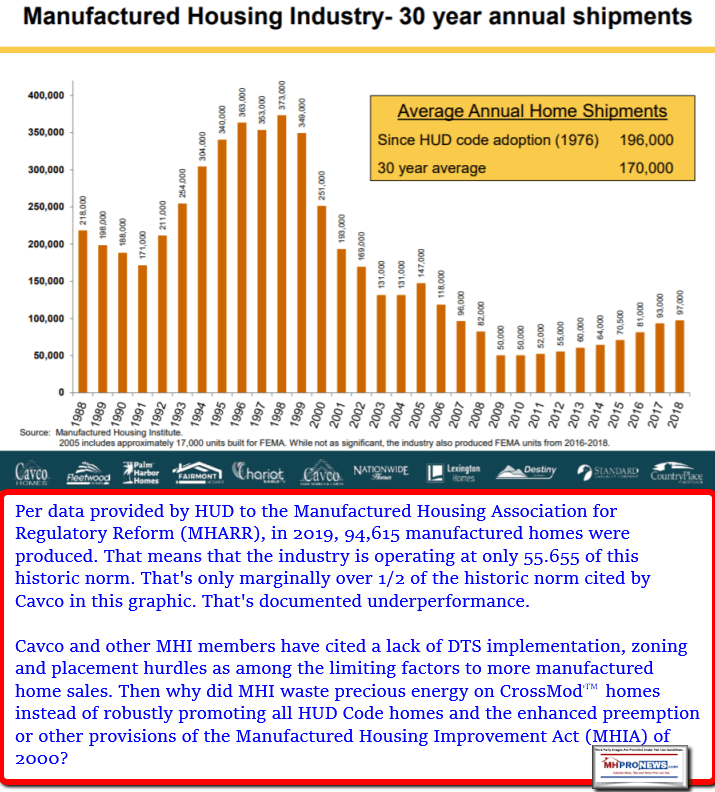
Other public firms involved in manufactured housing. Cavco is a well-known MHI member. The prior chairman of MHI’s board of directors known as the “MHI Executive Committee” was Joe Stegmayer. Stegmayer was also Chairman, President and CEO of Cavco. He was previously a division president of Clayton Homes. Stegmayer stepped down from his role as chairman, president and CEO of Cavco under the cloud of an SEC subpoena. Per prior and the most recent published statements by Cavco on January 31, 2020, the legal issues involved with that SEC investigation – which have not been fully disclosed – have cost the firm millions of dollars in legal, insurance and related expenses.
In that 1.31.2020 statement, William C. Boor, Cavco President and CEO said the following.
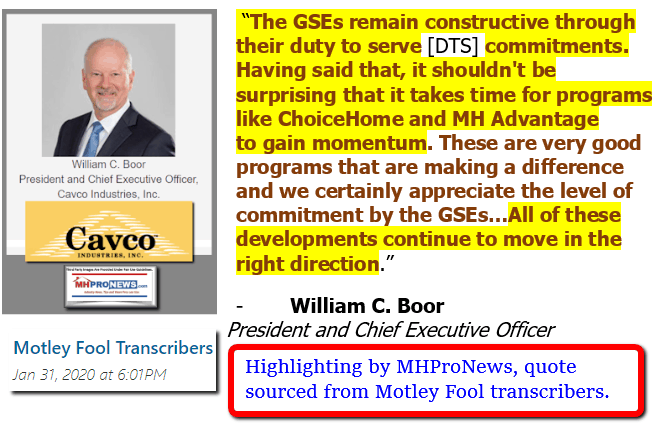
Note that these are facts and accurate quotes. There is no hyperbole or wild claims in this. These issues involve a prominent MHI member who has years of ties to Clayton Homes.
Recently, there was a White House Council on Eliminating Regulatory Barriers to Affordable Housing that included a public Request for Information (RFI). That is often public information, posted online. MHProNews published in its entirety a letter by Tim Williams of the Ohio Manufactured Home Association (OMHA). In that letter, Williams referred to the point that the White House Council – chaired by Secretary of Housing and Urban Development (HUD) Ben Carson, M.D. – specifically named manufactured housing connected barriers. That was accurate and appropriate.
In a subsequent article, MHProNews referenced OMHA’s Williams point. That’s called citing your source. There is nothing sinister about that, it’s considered to be a good academic and journalistic practice. Naming Williams and that reference in no way stated or implied that Williams concurred with what followed. Given that Williams’ entire comments had been previously published, anyone who wished could go back and read all of the OMHA’s executive director’s comments. Thus, there was nothing taken out of context or manipulated in what MHProNews published.
Against that backdrop, is the following from message by our publisher Tony Kovach to Williams, and by implication and reference, to Lesli Gooch and the MHI leadership team – that per sources set William’s emailed diversionary tactic in motion.
— Start of message to OMHA’s Tim Williams, et al —
Tim,
You and we have called each other friends. Sometime months ago, well prior to this incident, our sources tell me that you said to specific people connected with the Manufactured Housing Institute (MHI) that you didn’t want to be forced into taking sides between them and us.
That in connection with this recent email dustup started by your messages of February 10, 2020 are relevant. Other state association executives connected with the Manufactured Housing Executives Council (MHEC) have told me about the ‘carrots and sticks’ used to keep state associations in line with MHI. That’s on my mind as I write this to you.
While you’ve denied that you have been pushed into your emails with BCC’s to other state executives and MHI, our sources say otherwise. If you’d like to produce unedited screen captures of each of those emails – along the BCC list of all of those that you sent those messages to – I’m happy to publish the entire thread on MHProNews. That would allow the industry’s professionals to decide based upon clear evidence what was occurring and what the motivations behind it might be.
That said, let’s focus on facts and what ought to matter to the hard-working dues-paying members at MHI or state associations like yours. All those dues-paying firms of whatever size expect to be properly represented. Certainly, many if not most care about the industry’s advancement and measurable results.
Let’s step back in time for a few moments that your 25-year history in manufactured housing may recall, but others in the industry might not be aware of until they read this.
During the tenure of Walt Young Chairman MHI and Chairman of then Champion Enterprises, MHI entered into alliance. MHI worked with the Manufactured Housing Association for Regulatory Reform (MHARR) and other state associations, specifically the Texas Manufactured Housing Association (TMHA). Their leadership jointly worked to accomplish the passage of the Manufactured Housing Improvement Act (MHIA) of 2000. Chris Stinebert was MHI’s president at that time. The now semi-retired Danny Ghorbani was president of MHARR during that timeframe.
The goal of the MHIA 2000 or what some call the “2000 Act” was to complete the transformation the industry started by the National Manufactured Housing Construction and Safety Standards of 1974 (42 U.S.C. 5401-5426). That prior legislation moved manufactured homes out of the mobile home and previous “trailer house” era into the start of HUD Code manufactured housing on June 15, 1976.
The MHIA aimed to complete and refine that process. It provided significant consumer safeguards. As several Congressional lawmakers cited in the report linked below said, the MHIA was not only consumer protection it was an affordable housing law.
MHI, MHARR, the TMHA and others can all rightfully be proud of that joint effort. This is not the first time we’ve reported that, we’ve done so previously. So, when you wrote in the original message linked here that MHProNews and myself try “…to mislead your readers in order to continue your scorched earth campaign against MHI which does NOTHING but hurt our industry.” Pardon me? That is not only inaccurate but is potentially actionable. You wrote that with OMHA’s email. But let’s set the legal concern aside for now and return to the focus of history and on your unsupported claims about our reports and analysis, accuracy and facts.
Some years after the MHIA passed through joint MHI, MHARR and state associations efforts, the Duty to Serve (DTS) manufactured housing lending was passed into law under the Housing and Economic Recovery Act (HERA) of 2008. If the Duty to Serve (DTS) mandate on Fannie Mae and Freddie Mac – the so-called Government Sponsored Enterprises (GSEs) or “Enterprises” – then manufactured home lending could more readily reach the secondary money markets. That would increase competition in manufactured home lending and could result in better terms and lower interest rates. Lower rates and more lending, per the logic of the Urban Institute in 2018, would fuel even more appreciation for HUD Code manufactured homeowners.
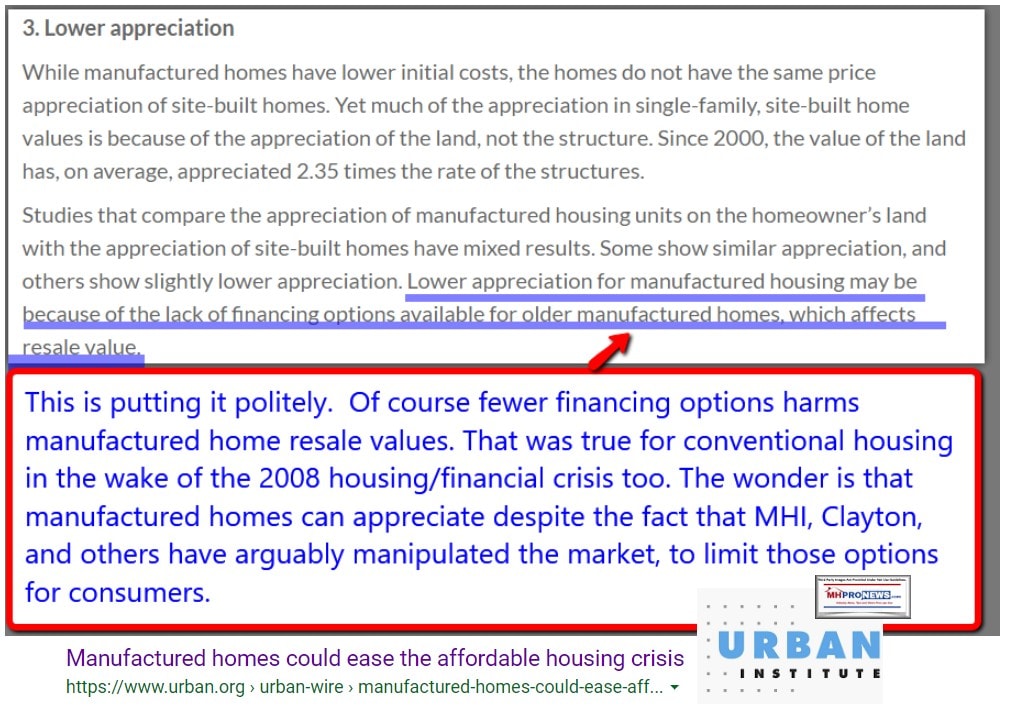
The focus of the manufactured housing industry’s sincere representatives logically ought to be to center at getting those existing laws fully and properly enforced.
- If DTS were fully enforced, several MHI member companies have said that more sales would result, as MHProNews has reported.
- If zoning and placement barriers were removed, a wide array of new placement and sales opportunities would open.
- In fairness, as we’ve often reported, MHI on paper says similarly. But what is arguably missing is the follow through on their words.
Rephrased, the manufactured home industry’s true turnaround would be accomplished if good existing laws were robustly enforced.
Instead of looking at the recovery of manufactured housing from the industry’s low point in 2009, which occurred in the wake of events documented here and recently analyzed here, the industry should be aiming to exceed the industry’s last high water mark of 1998. Even Richard “Dick” Jennison, MHI’s prior president and CEO, said that the industry can achieve 500,000 new HUD Code manufactured home produced and sold. Logically, why should the manufactured housing industry compare its accomplishments to the low point instead of aiming at the industry’s historic patterns or even higher true potential?
With those facts in mind and points in mind, isn’t it insulting to all state association and MHI dues payers to call Lesli Gooch’s work “superb” or the best you’ve seen in 25 years?
What MHI leaders in the past did in conjunction with MHARR and state associations, that was the last high-water mark for association activism that resembled something collectively worth taking pride in. If the MHIA and DTS implementation were the focus of MHI and every state association, then MHARR wouldn’t be fighting those battles at the federal level in as lonely a manner as has been true for some years.
True advocacy by MHI and their affiliates should be laser focused on the full and proper implementation of the MHIA, DTS and other lending programs that if properly implemented might well cause Berkshire Hathaway brands some profit, but would be good for consumers and the industry as a whole. Do you agree with the logic of that claim?
If you can logically dispute or disprove any of those points, please do so. I’m also hereby asking you to publicly apologize for your prior arguably misleading messages which per our sources have been spread via email and electronically to others.
I’m sorry that your emailed messages, reportedly bcc’d to others and shared in the wake of our exposes of Lesli Gooch and MHI leaders, failed to mention such critical facts and historical insights.
But let’s press a little further. Look at MHI’s current staff. Where is the institutional memory there? Why is MHI such a revolving door? By contrast, MHARR’s President and CEO Mark Weiss, J.D., was involved in drafting the MHIA. Danny Ghorbani is semi-retired, but I’m told that he still periodically advises on matters that he has decades of insights on. Never forget that Danny worked for MHI as a vice president for some years before being asked to start what today is MHARR.
Photos or videos with Dr. Carson, FHFA Director Mark Calabria or any other federal official by MHI leaders demonstrates their access. Why are they not using that access to press for a full and complete implementation of the MHIA, “enhanced preemption,” DTS and other useful federal laws?
No, sir. Photos and videos are not to be confused with measurable results. Filing a bill that may undermine the MHIA is logically not useful either.
If MHI is sincerely interested in working on behalf of more than a handful of what MHI award winner Marty Lavin has called “big boy” companies, they should press for the implementation of DTS, enhanced preemption and all of the provisions of the 2000 Act. Their pending bill should be modified as MHProNews previously reported or dropped.
If MHI can’t get enforcing existing laws fully implemented with their demonstrated access – which is what their photos and videos actually prove – then logically if MHI is sincere about getting these laws implemented, then they should publicly join MHARR and call for federal investigations by Congress. I’d personally advocate that MHI, MHARR and state associations like yours should press for relevant agencies to ask for state and federal probes in whatever corruption or inexplicably inept practices could possibly be keeping the industry at such low ebb 2 decades after the MHIA was enacted.
Summing up. If Lesli Gooch is as “superb” a leader as you claim, then you personally ask Ms. Gooch to publicly take these action steps. Actions speak louder than words.
In conclusion, when advocacy is involved, it should be able to objectively pass this acid test. Advocacy or effective lobbying by manufactured housing trade associations should meet two requirements:
1) It should be able to demonstrably benefit the entire industry – including consumer interests – not just the interests of a relatively small number of corporate companies. Keep in mind that Chris Stinebert said similarly.
2) Tangible and measurable results must be achieved. Those results are in part calculated by new HUD Code manufactured home shipment or production levels. When manufactured housing collectively is only doing about one fourth of its last highwater mark, how can you seriously claim that Gooch is the best leader you’ve seen in 25 years?
If only the industry could return to the type of cooperation that existed in the runup to the passage of the MHIA and the first few years thereafter, we would not have to report on the causes and cures for the industry’s documented underperformance.
As a related footnote in terms of evidence. One must not forget that we are tragically witnessing far more communities closing than opening. There are also thousands of homes a year being shipped today that are for rental purposes as opposed to being sold to homebuyers. Rephrased, the shipment data isn’t even as positive as it appears on the surface.
As an upcoming report that will feature a discussion with an economist we plan will attest, the manufactured home industry is being destabilized by a failure to enforce existing laws.
Get Ms. Gooch and MHI leaders to use their obvious access to achieve the full enforcement of Enhanced Preemption, all parts of the MHIA, DTS and other federal lending laws and we at MHProNews will celebrate publicly each of those who make that reality. In the absence of that, as noted, you, Ms. Gooch and the MHI leadership should publicly join MHARR in asking for Congressional probes using their subpoena powers to compel evidence and testimony.
Until then, your phrase of “scorched earth” isn’t a fair description of our holding industry leaders to account. Holding the powerful to account is the job of good media, and to cite sources accurately, that’s according to the Society for Professional Journalists (SPJ). I await your formal response to the above. Thank you.
Tony
L. A. “Tony” Kovach
Managing Member,
LifeStyle Factory Homes, LLC
publisher of DBNs MHProNews.com, MHLivingNews.com, LATonyKovach.com et al.
##
Related Points and MHProNews Analysis
On the Masthead blog, Tony Kovach has cited MHI member Skyline Champion President and CEO Mark Yost admitting that DTS is nowhere in sight for mainstream manufactured housing.
The Masthead documented statements by Randy Rowe that MHI’s claim of promoting DTS have gone unfulfilled years after they were made. If MHI’s leadership is as “superb” as Williams et al have said, why have they not been able to get existing laws fully enforced?
The Masthead also documented the concerns that a whistleblower with insider knowledge of MHI raised. The documents and direct quotes in each of those and other linked reports speak for themselves. We applaud those whistleblowers who provide MHProNews as ethically-minded pro-growth trade media with insider tips and documents. We could not do what we have been in recent years without those kinds of insider tips.

Speaking of Gooch and her documented side-gig that led to still other discoveries. The word heard is that OMHA’s Tim Williams’ moonlights doing ghostwriting. Depending on the content and party(ies) being written for, ghostwriting by an association executive may or may not be a problem. There is a question of if such purported ghostwriting has been disclosed to and authorized in writing by the OMHA’s association board.
But if there is validity to that claim about OMHA’s Williams’ ghostwriting for others, it raises a series of potentially related conflicts of interest. Furthermore, it also would reflect on Williams’ ability to write emails or other statements that may not reflect his personal beliefs. After all, ghostwriters produce the content that their client(s) wants. That casts a shadow on Williams’ emailed thread, who is actually behind it, and what the aims where for this purportedly artificial dustup that seems aimed to distract from substantive reports about Good, Jennison, MHI and their respective performance. It may merit further explanations and investigations by or on the behalf of OMHA members, especially if Williams doesn’t correct and retract his problematically bcc’d and shared-via-the-wires statements.
Given documented years of lobbying by ‘moonlighting’ Lesli Gooch – while she is in the ‘full time’ employ of MHI – that parallel is of relevant interest.
To be clear and fair, some associations hire an executive knowing that they are representing multiple interests. But when interests are in conflict, multiple interests are hidden or are otherwise undisclosed, that could be problematic for dues paying members. After all, dues are paid to an association to have their interests reflected, not that of someone else. That’s why conflict of interest is often part of association agreements, bylaws, and governing documents.
A former FBI agent recently published an article that noted what he said are possible ‘tells’ or clues to deceptive behavior. Paraphrasing, one possible clue to deceptive language is hyperbole or exaggeration that has no documentation or supporting evidence.
If there is a risk in manufactured housing today in fully exposing the corrupt practices that have hobbled the industry for well over a decade it includes this. The reality of the mounting evidence may sound so large, grave and impactful that it may sound implausible. That concern is one of the reasons MHProNews routinely cited sources, quoted in an appropriate fashion, links related evidence, and then often does a fact-check and analysis.
That concern noted, there are several possibly helpful parallels to be found in our contemporary period outside of manufactured housing.
- Bernie Madoff operated in the open for years until his ‘hiding in plain sight’ scheme was finally brought to justice.
- More recently, President Donald J. Trump or not, it seems clear that there are actors within the federal government who are willing to try to undermine his administration from within. If that is true for the president of the United States, and that claim is under investigation by the FBI and Department of Justice (DOJ), why would it be hard to imagine that specific individuals inside the federal government are working in collusion with MHI and key corporate interests to undermine the interests of manufactured housing independents and consumers?
Indeed, even without a need to reference specific documents, what is clear is this. Laws exist that are not being enforced. MHI, MHARR and state associations – on paper – all agree on that point. The lack of enforcement of those laws harms smaller firms while it tends to help bigger ones that are focused on industry consolidation.
The key issue ought to be what happens after postured statements made by MHI and their affiliates occurs. As our publisher has advocated, will MHI, state associations and ‘big boy’ corporate leaders formally and publicly join MHARR and ask for Congress to investigate these matters at HUD and FHFA?
In summary, the timing of OMHA’s Tim Williams’ emailed missives in the wake of insider revelations about MHI’s Lesli Gooch and documents that reflect possible perjury and other problematic behavior by her predecessor Richard “Dick” Jennison are potential efforts at distraction from simple truths.
- The manufactured home industry is underperforming during an affordable housing crisis.
- Laws exist that aren’t being properly enforced.
- Remedies to that ongoing problem have arguably not been fully pursued by MHI, why not?
Federal officials are tasked by law with enforcement of Congressionally enacted legislation that aimed at supporting affordable manufactured housing and making financing of manufactured homes easier, even if no association were asking for the enforcement of DTS, enhanced preemption and the balance of the MHIA.
The logical thing that MHI should be doing is pushing – not on paper, but in fact – for a full and proper implementation of existing laws.
MHI has repeatedly proved their access to HUD Secretary Carson, to Brian Montgomery, Teresa Payne, and the FHFA Director Mark Calabria and DTS manager Jim Gray, among others. Photos and videos document that access.
If key officials at HUD, FHFA or elsewhere aren’t following the law, then MHI should logically join MHARR in publicly asking for Congressional oversight hearings.
2020 is an election year. Affordable housing is an important topic in all 50 states and in U.S. territories, like Puerto Rico.
Manufactured housing has long enjoyed bipartisan support. While “predatory lending” – a phrase that former Congressman Barney Frank periodically used to describe lending in manufactured housing has been an issue, DTS, FHA Title I and II, VA, or USDA loans were among the federal remedies to that issue.
Is it a mere coincidence that failure to enforce good laws helps consolidators, while undermining manufactured homeowners, independent professionals and their investors? Or is that part of the plan?
With that question in mind, consider once more what Skyline’s CFO said.

Each of these issues begs for action. On behalf of MHProNews, we are hereby calling on OMHA’s Tim Williams to make formal inquiries by public agencies into these issues promptly and then publish for his members the documentation for those formal requests.
We are editorially also calling on MHI to join MHARR in their call for Congressional oversight and other formal legal probes. If they fail to do so, on what logic will they rely on?
That’s a snapshot of the case for why OMHA’s Williams sent such messages in the first place – as diversionary tactics. But what it has arguably done is boomerang in this sense. It causes the industry’s objective thinkers to look at what is occurring and why. If MHI were routinely and persistently doing what they claim in their own IRS Form 990s, then the industry would arguably be years ahead of where it is now.
To learn more, see the related reports linked from the above or that follow below. Because failing to implement good existing laws isn’t a matter of policy or style differences. These are questions of enforcing existing laws. It is failure to enforce those laws, and those who are involved in that diversion, that have done the actual “scorched earth” campaign against manufactured housing industry professionals and consumers during an affordable housing crisis.
To go deeper on the related issues that are keeping manufactured housing underperforming during an affordable housing crisis, see the timely reports above or further below. That’s it for this report on manufactured housing “Industry News Tips and Views Pros Can Use“ © – MHVille’s runaway #1 news source, where “We Provide, You Decide.” © (News, fact-checks, analysis, and commentary.) Notice: all third party images or content are provided under fair use guidelines for media. 
Submitted by Soheyla Kovach for MHProNews.com. Soheyla is a co-founder and managing member of LifeStyle Factory Homes, LLC, the parent company to MHProNews, and MHLivingNews.com. Connect with us on LinkedIn here and here.
No Title
No Description
No Title
No Description

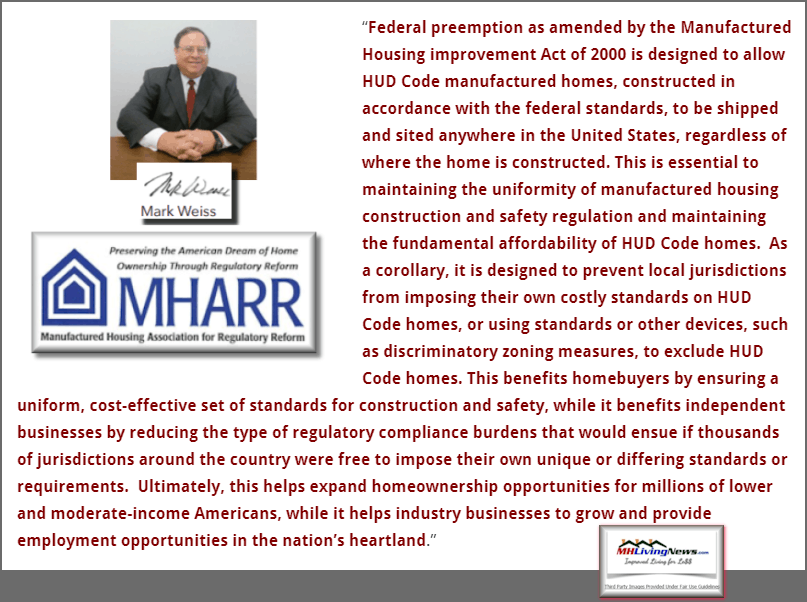
There is more than enough evidence that there is corruption, deceptive trade practices and other arguably illegal activities that are benefiting a few to the harm of the many. See the related articles below.
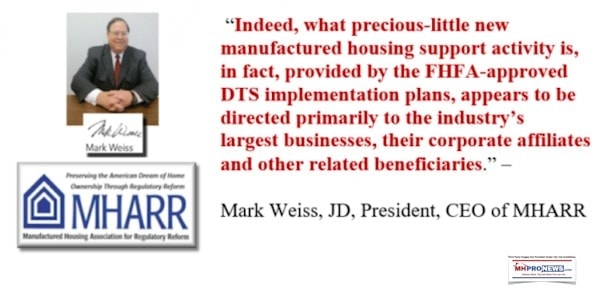
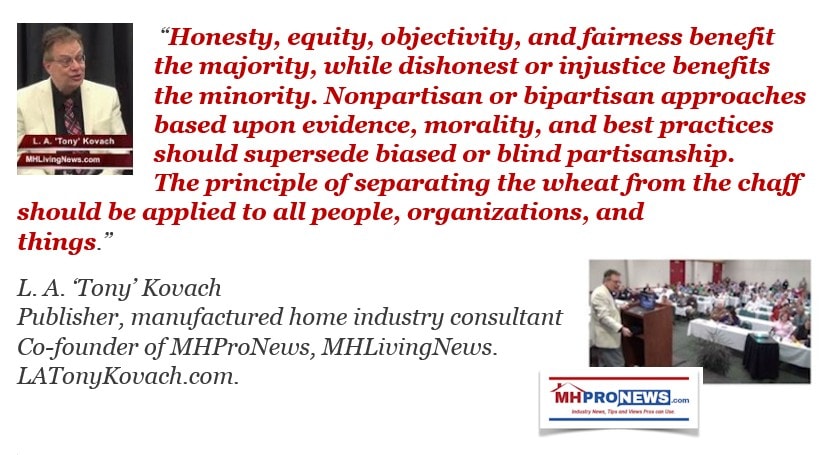
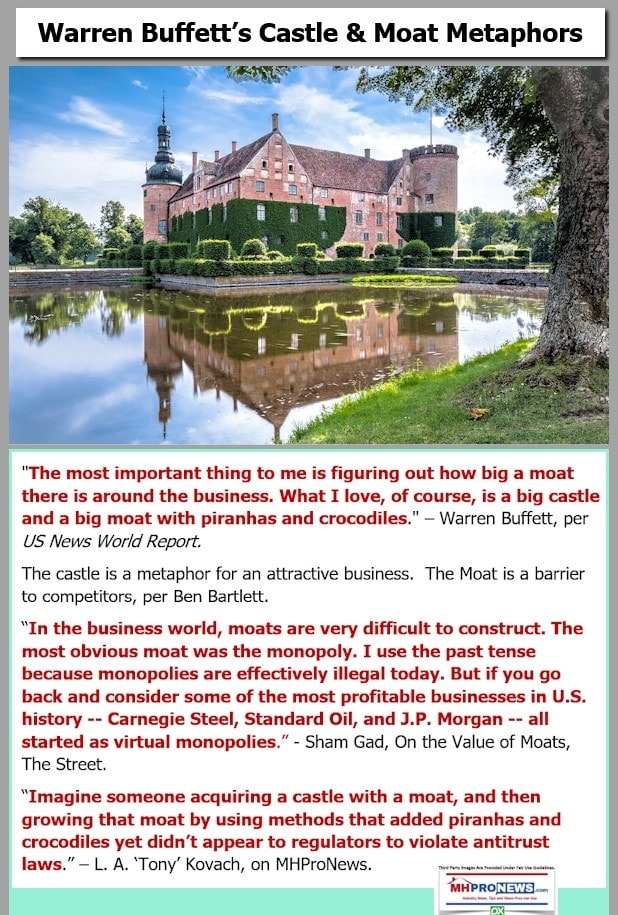
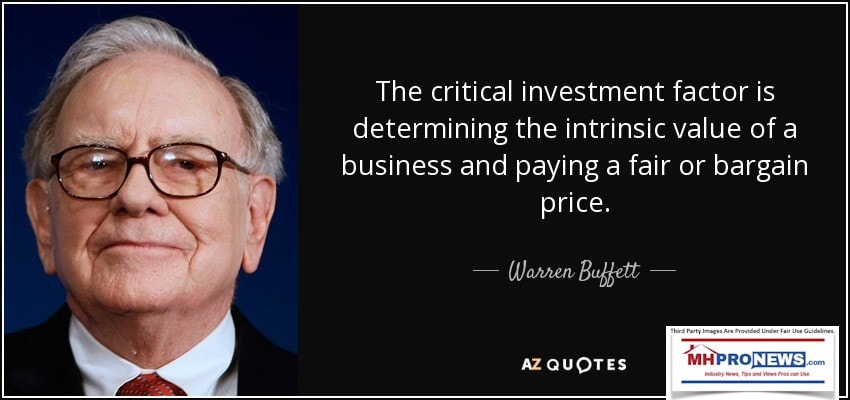
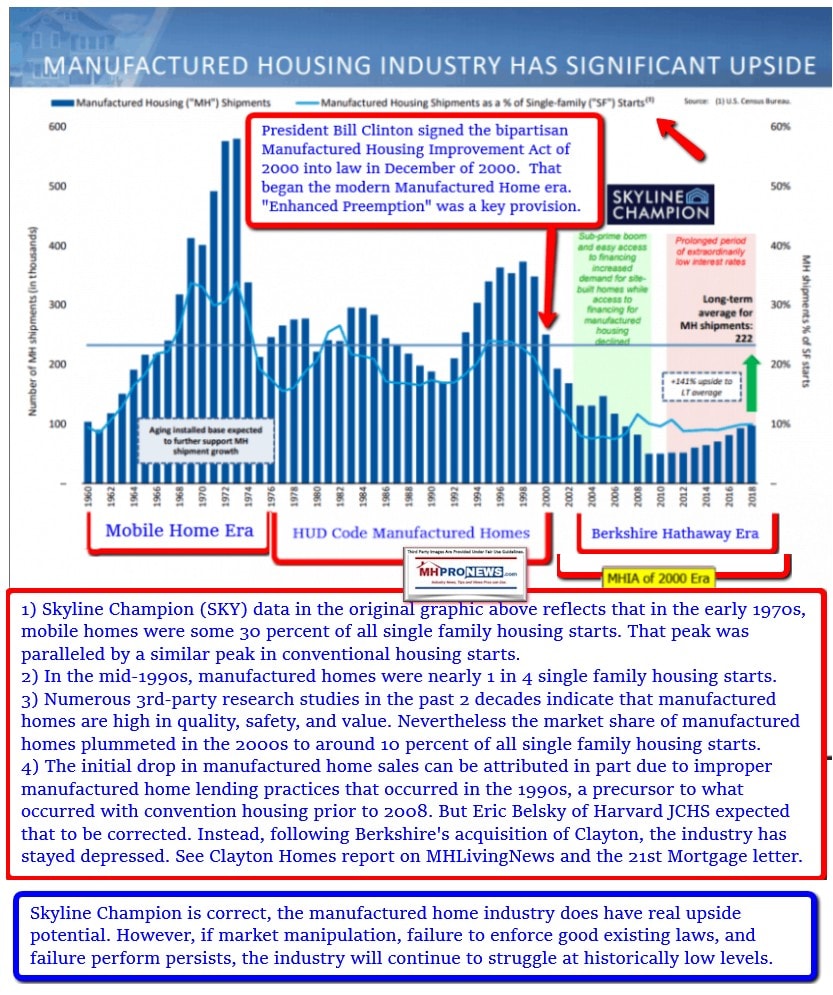
The bad news is that the opposition to ethical ‘white hat’ businesses, investors and other professionals have deep pockets and they are politically connected. But the good news is that Bernie Madoff could have once made that similar claim. Today, Madoff sits in a federal cell. It took persistence on the part of a few professionals with federal officials to finally topple Madoff’s multi-billion dollar empire.
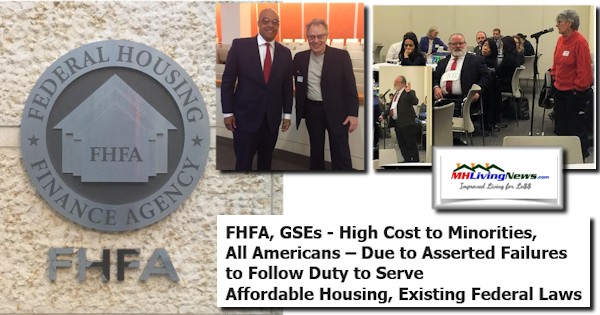
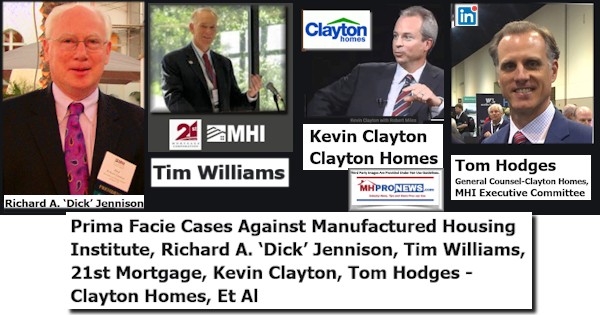
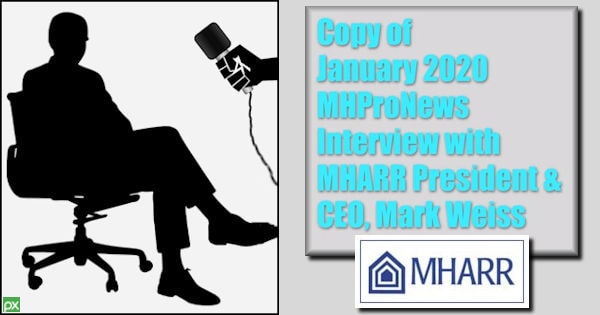
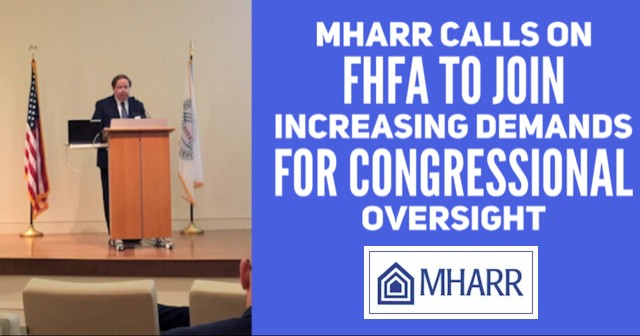
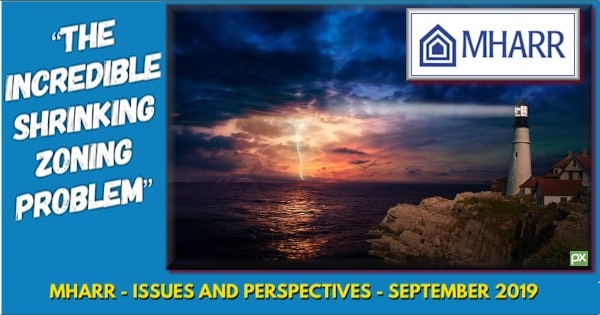

Whistleblower’s Documents on Lesli Gooch – Manufactured Housing Institute CEO – New Discoveries
